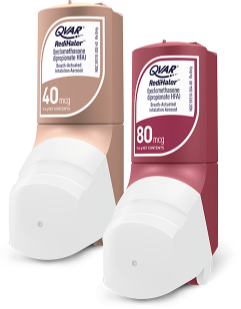Important Safety Information
- Contraindications: QVAR RediHaler is contraindicated in:
- Primary treatment of status asthmaticus or other acute episodes of asthma where intensive measures are required
- Patients with known hypersensitivity to beclomethasone dipropionate or any of the ingredients in QVAR RediHaler
- Oropharyngeal Candidiasis: Localized infections with Candida albicans have occurred in the mouth and pharynx in some patients receiving QVAR RediHaler. Advise rinsing of mouth with water without swallowing after use. If oropharyngeal candidiasis develops, QVAR RediHaler may need to be temporarily interrupted under close medical supervision
- Deterioration of asthma and acute episodes: Do not use QVAR RediHaler for the relief of acute symptoms. Instruct patients to contact their physician immediately if episodes of asthma that are not responsive to bronchodilators occur during the course of treatment with QVAR RediHaler
- Transferring Patients from Systemic Corticosteroid Therapy: Particular care is needed in patients who are transferred from systemically active corticosteroids to QVAR RediHaler because deaths due to adrenal insufficiency have occurred in asthmatic patients during and after transfer from systemic corticosteroids to less systemically available inhaled corticosteroids. Taper patients slowly from systemic corticosteroids if transferring to QVAR RediHaler
- Immunosuppression and Risks of Infections: Patients who are on drugs that suppress the immune system, such as corticosteroids, are more susceptible to infections than healthy individuals and should avoid exposure to chicken pox or measles. Inhaled corticosteroids should be used with caution, if at all, in patients with active or quiescent tuberculosis infection of the respiratory tract; untreated systemic fungal, bacterial, parasitic, or viral infections; or ocular herpes simplex
- Paradoxical Bronchospasm: Inhaled corticosteroids may produce inhalation-induced bronchospasm with an immediate increase in wheezing after dosing that may be life-threatening. If this occurs with QVAR RediHaler, it should be treated immediately with an inhaled, short-acting bronchodilator. Treatment with QVAR RediHaler should be discontinued and alternate therapy instituted
- Hypersensitivity reactions: Hypersensitivity reactions, such as urticaria, angioedema, rash, and bronchospasm, may occur after administration of QVAR RediHaler. Discontinue QVAR RediHaler if such reactions occur
- Hypercorticism and Adrenal Suppression: It is possible that systemic corticosteroid effects such as hypercorticism and adrenal suppression may appear in a small number of patients, particularly at higher than recommended doses. If such changes occur, reduce the QVAR RediHaler dose slowly, consistent with accepted procedures for reducing systemic corticosteroids and for management of asthma symptoms
- Effects on Growth: Orally inhaled corticosteroids, including QVAR RediHaler, may cause a reduction in growth velocity when administered to pediatric patients. Routinely monitor the growth of pediatric patients receiving QVAR RediHaler. To minimize the systemic effects, titrate to the lowest dosage that effectively controls symptoms
- Reduction in Bone Mineral Density (BMD): Decreases in bone mineral density have been observed with long-term administration of products containing inhaled corticosteroids. Patients with major risk factors for decreased bone mineral content should be monitored and treated with established standards of care
- Glaucoma and Cataracts: Glaucoma, increased intraocular pressure, blurred vision and cataracts have been reported following the long-term administration of inhaled corticosteroids. Therefore, close monitoring is warranted in patients with a change in vision or with a history of increased intraocular pressure, blurred vision, glaucoma, and/or cataracts
- Adverse Reactions: Most common adverse reactions (incidence ≥3% and >placebo) include oral candidiasis, upper respiratory tract infection, nasopharyngitis, allergic rhinitis, oropharyngeal pain and sinusitis.
Indication
QVAR RediHaler is indicated for the maintenance treatment of asthma as prophylactic therapy in patients 4 years of age or older.
Limitation of Use: QVAR RediHaler is not indicated for the relief of acute bronchospasm.
Please see full Prescribing Information.


